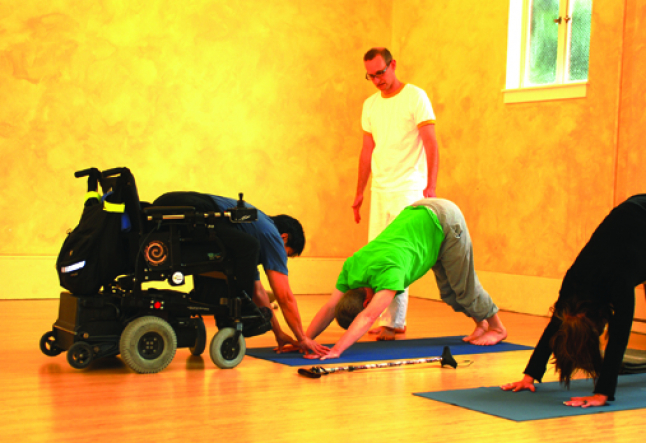yoga-accessible to everyone

What does it really mean to be a yoga teacher? Does it mean that you have perfected the asanas? Could someone with a physical limitation be a yoga teacher? These are the questions I had to ask myself when one of my long-time students, Eric Fine, was getting more and more serious about yoga. Eric has Multiple Sclerosis, but his symptoms are relatively mild—he has some cognitive problems, fatigue, weakness in his legs and balance problems. But despite this I knew that he would enjoy immersing himself in the study of yoga, and I recommended that he enroll in a yoga teacher training program.
I had been leading teacher trainings for some time, and I recognized that Eric could be a great teacher and an inspiration to students. He followed my advice but found the program very difficult. “Keeping up with fully able-bodied, non-ill people who don’t have any cognitive problems, and have vastly more energy, was just impossible for me,” he explained. Eric attended all the classes, but the certification eluded him. In the end, he was very disappointed.
But, Eric hadn’t failed, the training had failed him. Over the past twelve years of teaching yoga, I’ve learned that it’s my love of yoga and my faith in the power of these practices that inspires my teaching. My physical ability is not the essential ingredient. After all, yoga is about calming the mind. Being a yoga teacher is about being a living example of the teachings—putting yoga into practice. According to Patanjali’s Yoga Sutras, that means learning from pain (tapas), study and reflection (svadhyaya) and dedicating the fruits of your actions to God or to humanity (Ishwara pranidhana).
I began to imagine a teacher training that begins with the idea that anyone who loves yoga can share it, and that a physical limitation does not limit spiritual growth. Instead, it is up to me to find ways of making the program accessible to anyone who has the motivation to take it on. With patience and creativity, all of the material can be presented in a more digestible way, while maintaining a commitment to the highest of standards.
Eric explained to me that with more support he could have done it. “I think the real difference for me would have been to have fellow students work with me at my pace; to have a group of students who understand each other, to work around issues, energetic or cognitive, and to help each other work past various obstacles. Yes, I have limitations, but I also think I have a lot to offer. If I had been part of a group committed to making up for the different shortcomings in each other and supporting everyone in the group, I would have been able to ultimately do what I needed to in order to become a teacher.”
The gift of a good teacher training program is a community that supports you through the pain and growth of transformation. People with physical limitations already know about transformation and growth, and the wisdom that they have learned can be a great asset to a yoga teacher. It can lead to a deep compassion for future students and a willingness and ability to look at someone and see potential rather than limitation. What better person to become a yoga teacher than someone full of compassion and understanding for our physical weaknesses, and yet also aware of our hidden potential?
I’m dedicated to helping Eric achieve his goal of becoming a certified yoga teacher. I know he already has what it takes to be a great teacher. I’m also hopeful that this new accessible training will allow other people with physical limitations to reach a goal that they may not otherwise have been able to achieve.
Accessible Teacher Training is a program of the Integral Yoga Institute of San Francisco in collaboration with the Piedmont Yoga Studio in Oakland.
integralyogasf.org
415.821.1117 ext. 375.